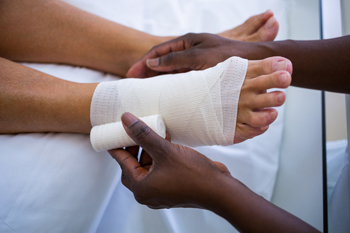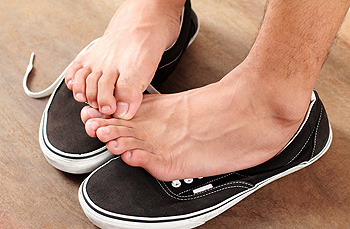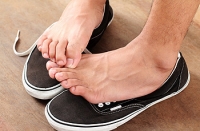
Blog (816)
Identifying Your Wound
 People can develop a wound for a number of reasons. When a wound has occurred, it’s important that you be able to identify it, that way you know how best to treat it. Wounds may either be open or closed. Open wounds break the skin and may leave the internal tissue exposed. Closed wounds, however, do not break the skin. These types of wounds may involve tissue damage or bleeding that occurs underneath the skin’s surface. Whether a wound is opened or closed, immediate care should be sought in order to help prevent getting an infection. Those with diabetes should take particular care of their feet in order to avoid getting a wound, as they are more likely to develop an infection, which may lead to further foot complications. For more advice on how to identify and treat wounds of the feet, we recommend you consult with a podiatrist for professional care and treatment.
People can develop a wound for a number of reasons. When a wound has occurred, it’s important that you be able to identify it, that way you know how best to treat it. Wounds may either be open or closed. Open wounds break the skin and may leave the internal tissue exposed. Closed wounds, however, do not break the skin. These types of wounds may involve tissue damage or bleeding that occurs underneath the skin’s surface. Whether a wound is opened or closed, immediate care should be sought in order to help prevent getting an infection. Those with diabetes should take particular care of their feet in order to avoid getting a wound, as they are more likely to develop an infection, which may lead to further foot complications. For more advice on how to identify and treat wounds of the feet, we recommend you consult with a podiatrist for professional care and treatment.
Wound care is an important part in dealing with diabetes. If you have diabetes and a foot wound or would like more information about wound care for diabetics, consult with Dr. Kenneth Donovan from Advanced Care Foot and Ankle. Our doctor will assess your condition and provide you with quality foot and ankle treatment.
What Is Wound Care?
Wound care is the practice of taking proper care of a wound. This can range from the smallest to the largest of wounds. While everyone can benefit from proper wound care, it is much more important for diabetics. Diabetics often suffer from poor blood circulation which causes wounds to heal much slower than they would in a non-diabetic.
What Is the Importance of Wound Care?
While it may not seem apparent with small ulcers on the foot, for diabetics, any size ulcer can become infected. Diabetics often also suffer from neuropathy, or nerve loss. This means they might not even feel when they have an ulcer on their foot. If the wound becomes severely infected, amputation may be necessary. Therefore, it is of the upmost importance to properly care for any and all foot wounds.
How to Care for Wounds
The best way to care for foot wounds is to prevent them. For diabetics, this means daily inspections of the feet for any signs of abnormalities or ulcers. It is also recommended to see a podiatrist several times a year for a foot inspection. If you do have an ulcer, run the wound under water to clear dirt from the wound; then apply antibiotic ointment to the wound and cover with a bandage. Bandages should be changed daily and keeping pressure off the wound is smart. It is advised to see a podiatrist, who can keep an eye on it.
If you have any questions, please feel free to contact one of our offices located in Warren, Livingston, and Toms River, NJ . We offer the newest diagnostic and treatment technologies for all your foot care needs.
Are Bunions Affecting Your Everyday Life?
Are Bunions Affecting Your Everyday Life?
Possible Symptoms of Athlete’s Foot
The medical condition that is known as athlete’s foot often affects the top layer of skin on the foot. It lives and thrives in warm and moist environments, which can include shower room floors, public pools, or locker rooms, and surrounding areas. Many patients experience symptoms that typically consist of severe itching between the toes, and flaking skin on the bottom of the feet. Additionally, there may be a tingling or burning sensation that is felt on different parts of the feet. Athlete’s foot is considered to be contagious, and may be transmitted to another person in contaminated clothing, socks, or shoes. For mild cases of this ailment, mild relief may be found by applying an anti-fungal powder or cream. If you feel you have developed athlete’s foot, it is suggested that you consult with a podiatrist who can guide you toward the best treatment for you.
Athlete’s Foot
Athlete’s foot is often an uncomfortable condition to experience. Thankfully, podiatrists specialize in treating athlete’s foot and offer the best treatment options. If you have any questions about athlete’s foot, consult with Dr. Kenneth Donovan from Advanced Care Foot and Ankle. Our doctor will assess your condition and provide you with quality treatment.
What Is Athlete’s Foot?
Tinea pedis, more commonly known as athlete’s foot, is a non-serious and common fungal infection of the foot. Athlete’s foot is contagious and can be contracted by touching someone who has it or infected surfaces. The most common places contaminated by it are public showers, locker rooms, and swimming pools. Once contracted, it grows on feet that are left inside moist, dark, and warm shoes and socks.
Prevention
The most effective ways to prevent athlete’s foot include:
- Thoroughly washing and drying feet
- Avoid going barefoot in locker rooms and public showers
- Using shower shoes in public showers
- Wearing socks that allow the feet to breathe
- Changing socks and shoes frequently if you sweat a lot
Symptoms
Athlete’s foot initially occurs as a rash between the toes. However, if left undiagnosed, it can spread to the sides and bottom of the feet, toenails, and if touched by hand, the hands themselves. Symptoms include:
- Redness
- Burning
- Itching
- Scaly and peeling skin
Diagnosis and Treatment
Diagnosis is quick and easy. Skin samples will be taken and either viewed under a microscope or sent to a lab for testing. Sometimes, a podiatrist can diagnose it based on simply looking at it. Once confirmed, treatment options include oral and topical antifungal medications.
If you have any questions, please feel free to contact one of our offices located in Warren, Livingston, and Toms River, NJ . We offer the newest diagnostic and treatment technologies for all your foot care needs.
Possible Symptoms of Athlete’s Foot
 The medical condition that is known as athlete’s foot often affects the top layer of skin on the foot. It lives and thrives in warm and moist environments, which can include shower room floors, public pools, or locker rooms, and surrounding areas. Many patients experience symptoms that typically consist of severe itching between the toes, and flaking skin on the bottom of the feet. Additionally, there may be a tingling or burning sensation that is felt on different parts of the feet. Athlete’s foot is considered to be contagious, and may be transmitted to another person in contaminated clothing, socks, or shoes. For mild cases of this ailment, mild relief may be found by applying an anti-fungal powder or cream. If you feel you have developed athlete’s foot, it is suggested that you consult with a podiatrist who can guide you toward the best treatment for you.
The medical condition that is known as athlete’s foot often affects the top layer of skin on the foot. It lives and thrives in warm and moist environments, which can include shower room floors, public pools, or locker rooms, and surrounding areas. Many patients experience symptoms that typically consist of severe itching between the toes, and flaking skin on the bottom of the feet. Additionally, there may be a tingling or burning sensation that is felt on different parts of the feet. Athlete’s foot is considered to be contagious, and may be transmitted to another person in contaminated clothing, socks, or shoes. For mild cases of this ailment, mild relief may be found by applying an anti-fungal powder or cream. If you feel you have developed athlete’s foot, it is suggested that you consult with a podiatrist who can guide you toward the best treatment for you.
Athlete’s Foot
Athlete’s foot is often an uncomfortable condition to experience. Thankfully, podiatrists specialize in treating athlete’s foot and offer the best treatment options. If you have any questions about athlete’s foot, consult with Dr. Kenneth Donovan from Advanced Care Foot and Ankle. Our doctor will assess your condition and provide you with quality treatment.
What Is Athlete’s Foot?
Tinea pedis, more commonly known as athlete’s foot, is a non-serious and common fungal infection of the foot. Athlete’s foot is contagious and can be contracted by touching someone who has it or infected surfaces. The most common places contaminated by it are public showers, locker rooms, and swimming pools. Once contracted, it grows on feet that are left inside moist, dark, and warm shoes and socks.
Prevention
The most effective ways to prevent athlete’s foot include:
- Thoroughly washing and drying feet
- Avoid going barefoot in locker rooms and public showers
- Using shower shoes in public showers
- Wearing socks that allow the feet to breathe
- Changing socks and shoes frequently if you sweat a lot
Symptoms
Athlete’s foot initially occurs as a rash between the toes. However, if left undiagnosed, it can spread to the sides and bottom of the feet, toenails, and if touched by hand, the hands themselves. Symptoms include:
- Redness
- Burning
- Itching
- Scaly and peeling skin
Diagnosis and Treatment
Diagnosis is quick and easy. Skin samples will be taken and either viewed under a microscope or sent to a lab for testing. Sometimes, a podiatrist can diagnose it based on simply looking at it. Once confirmed, treatment options include oral and topical antifungal medications.
If you have any questions, please feel free to contact one of our offices located in Warren, Livingston, and Toms River, NJ . We offer the newest diagnostic and treatment technologies for all your foot care needs.
Types of Stretches
The sport of running or jogging can be more enjoyable when the muscles are properly stretched. Many runners practice static stretching, which enables the muscles and tendons to become more flexible. However, research has shown this type of stretch may inhibit nerve contraction, which may have a negative impact on how fast you can run. It may be more advantageous to perform stretches than can increase the range of motion before embarking on a run. Additionally, it is important to stretch the calves after a run is completed, as this may help to loosen any tight muscles. If you’re interested in learning more about the benefits of stretching the feet before and after running, it is suggested that you consult with a podiatrist.
Why Stretching Is Important for Your Feet
Stretching the feet is a great way to prevent injuries. If you have any concerns with your feet consult with Dr. Kenneth Donovan from Advanced Care Foot and Ankle. Our doctor will assess your condition and provide you with quality foot and ankle treatment.
Stretching the Feet
Stretching the muscles in the foot is an important part in any physical activity. Feet that are tight can lead to less flexibility and make you more prone to injury. One of the most common forms of foot pain, plantar fasciitis, can be stretched out to help ease the pain. Stretching can not only ease pain from plantar fasciitis but also prevent it as well. However, it is important to see a podiatrist first to determine if stretching is right for you. Podiatrists can also recommend other ways to stretch your feet. Once you know whether stretching is right for you, here are some excellent stretches you can do.
- Using a foam roller or any cylindrical object (a water bottle or soda can will do), roll the object under your foot back and forth. You should also exert pressure on the object. Be sure to do this to both feet for a minute. Do this exercise three times each.
- Similar to the previous exercise, take a ball, such as a tennis ball, and roll it under your foot while seated and exert pressure on it.
- Grab a resistance band or towel and take a seat. If you are using a towel, fold it length wise. Next put either one between the ball of your foot and heel and pull with both hands on each side towards you. Hold this for 15 seconds and then switch feet. Do this three times for each foot.
- Finally hold your big toe while crossing one leg over the other. Pull the toe towards you and hold for 15 seconds. Once again do this three times per foot.
It is best to go easy when first stretching your foot and work your way up. If your foot starts hurting, stop exercising to ice and rest the foot. It is advised that you then see a podiatrist for help.
If you have any questions, please feel free to contact one of our offices located in Warren, Livingston, and Toms River, NJ . We offer the newest diagnostic and treatment technologies for all your foot care needs.
Types of Stretches
 The sport of running or jogging can be more enjoyable when the muscles are properly stretched. Many runners practice static stretching, which enables the muscles and tendons to become more flexible. However, research has shown this type of stretch may inhibit nerve contraction, which may have a negative impact on how fast you can run. It may be more advantageous to perform stretches than can increase the range of motion before embarking on a run. Additionally, it is important to stretch the calves after a run is completed, as this may help to loosen any tight muscles. If you’re interested in learning more about the benefits of stretching the feet before and after running, it is suggested that you consult with a podiatrist.
The sport of running or jogging can be more enjoyable when the muscles are properly stretched. Many runners practice static stretching, which enables the muscles and tendons to become more flexible. However, research has shown this type of stretch may inhibit nerve contraction, which may have a negative impact on how fast you can run. It may be more advantageous to perform stretches than can increase the range of motion before embarking on a run. Additionally, it is important to stretch the calves after a run is completed, as this may help to loosen any tight muscles. If you’re interested in learning more about the benefits of stretching the feet before and after running, it is suggested that you consult with a podiatrist.
Why Stretching Is Important for Your Feet
Stretching the feet is a great way to prevent injuries. If you have any concerns with your feet consult with Dr. Kenneth Donovan from Advanced Care Foot and Ankle. Our doctor will assess your condition and provide you with quality foot and ankle treatment.
Stretching the Feet
Stretching the muscles in the foot is an important part in any physical activity. Feet that are tight can lead to less flexibility and make you more prone to injury. One of the most common forms of foot pain, plantar fasciitis, can be stretched out to help ease the pain. Stretching can not only ease pain from plantar fasciitis but also prevent it as well. However, it is important to see a podiatrist first to determine if stretching is right for you. Podiatrists can also recommend other ways to stretch your feet. Once you know whether stretching is right for you, here are some excellent stretches you can do.
- Using a foam roller or any cylindrical object (a water bottle or soda can will do), roll the object under your foot back and forth. You should also exert pressure on the object. Be sure to do this to both feet for a minute. Do this exercise three times each.
- Similar to the previous exercise, take a ball, such as a tennis ball, and roll it under your foot while seated and exert pressure on it.
- Grab a resistance band or towel and take a seat. If you are using a towel, fold it length wise. Next put either one between the ball of your foot and heel and pull with both hands on each side towards you. Hold this for 15 seconds and then switch feet. Do this three times for each foot.
- Finally hold your big toe while crossing one leg over the other. Pull the toe towards you and hold for 15 seconds. Once again do this three times per foot.
It is best to go easy when first stretching your foot and work your way up. If your foot starts hurting, stop exercising to ice and rest the foot. It is advised that you then see a podiatrist for help.
If you have any questions, please feel free to contact one of our offices located in Warren, Livingston, and Toms River, NJ . We offer the newest diagnostic and treatment technologies for all your foot care needs.
How to Help Seniors Care for Their Feet
Elderly people may have difficulty in maintaining proper foot care. This may be a result of being unable to bend down to correctly trim the toenails. Additionally, it may be challenging to wash and dry the feet thoroughly, which may lead to the development of painful foot conditions. Seniors may have trouble seeing any existing wounds on the feet, and the skin may become dry and cracked. It may be beneficial if a caregiver can help older people to properly manage everyday foot care by gently massaging their feet, followed by using a moisturizing lotion. If you have questions about how to take care of elderly feet, it is suggested that you speak to a podiatrist.
Proper foot care is something many older adults forget to consider. If you have any concerns about your feet and ankles, contact Dr. Kenneth Donovan from Advanced Care Foot and Ankle. Our doctor can provide the care you need to keep you pain-free and on your feet.
The Elderly and Their Feet
As we age we start to notice many changes in our body, but the elder population may not notice them right away. Medical conditions may prevent the elderly to take notice of their foot health right away. Poor vision is a lead contributor to not taking action for the elderly.
Common Conditions
- Neuropathy – can reduce feeling in the feet and can hide many life-threatening medical conditions.
- Reduced flexibility – prevents the ability of proper toenail trimming, and foot cleaning. If left untreated, it may lead to further medical issues.
- Foot sores – amongst the older population can be serious before they are discovered. Some of the problematic conditions they may face are:
- Gouging toenails affecting nearby toe
- Shoes that don’t fit properly
- Pressure sores
- Loss of circulation in legs & feet
- Edema & swelling of feet and ankles
Susceptible Infections
Diabetes and poor circulation can cause general loss of sensitivity over the years, turning a simple cut into a serious issue.
If you have any questions please feel free to contact one of our offices located in Warren, Livingston, and Toms River, NJ . We offer the newest diagnostic and treatment technologies for all your foot and ankle needs.
How to Help Seniors Care for Their Feet
 Elderly people may have difficulty in maintaining proper foot care. This may be a result of being unable to bend down to correctly trim the toenails. Additionally, it may be challenging to wash and dry the feet thoroughly, which may lead to the development of painful foot conditions. Seniors may have trouble seeing any existing wounds on the feet, and the skin may become dry and cracked. It may be beneficial if a caregiver can help older people to properly manage everyday foot care by gently massaging their feet, followed by using a moisturizing lotion. If you have questions about how to take care of elderly feet, it is suggested that you speak to a podiatrist.
Elderly people may have difficulty in maintaining proper foot care. This may be a result of being unable to bend down to correctly trim the toenails. Additionally, it may be challenging to wash and dry the feet thoroughly, which may lead to the development of painful foot conditions. Seniors may have trouble seeing any existing wounds on the feet, and the skin may become dry and cracked. It may be beneficial if a caregiver can help older people to properly manage everyday foot care by gently massaging their feet, followed by using a moisturizing lotion. If you have questions about how to take care of elderly feet, it is suggested that you speak to a podiatrist.
Proper foot care is something many older adults forget to consider. If you have any concerns about your feet and ankles, contact Dr. Kenneth Donovan from Advanced Care Foot and Ankle. Our doctor can provide the care you need to keep you pain-free and on your feet.
The Elderly and Their Feet
As we age we start to notice many changes in our body, but the elder population may not notice them right away. Medical conditions may prevent the elderly to take notice of their foot health right away. Poor vision is a lead contributor to not taking action for the elderly.
Common Conditions
- Neuropathy – can reduce feeling in the feet and can hide many life-threatening medical conditions.
- Reduced flexibility – prevents the ability of proper toenail trimming, and foot cleaning. If left untreated, it may lead to further medical issues.
- Foot sores – amongst the older population can be serious before they are discovered. Some of the problematic conditions they may face are:
- Gouging toenails affecting nearby toe
- Shoes that don’t fit properly
- Pressure sores
- Loss of circulation in legs & feet
- Edema & swelling of feet and ankles
Susceptible Infections
Diabetes and poor circulation can cause general loss of sensitivity over the years, turning a simple cut into a serious issue.
If you have any questions please feel free to contact one of our offices located in Warren, Livingston, and Toms River, NJ . We offer the newest diagnostic and treatment technologies for all your foot and ankle needs.











